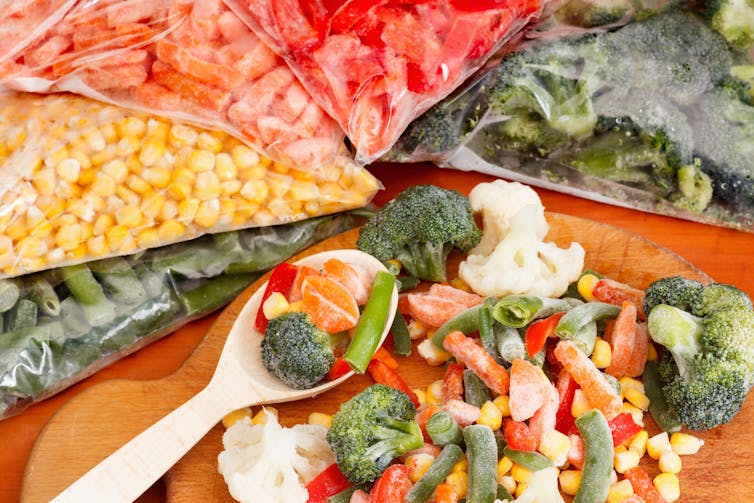Frozen, canned or fermented: when you can't shop often for fresh vegetables, what are the best alternatives?
- Written by Jesse Beasley, PhD Student in BioSciences, University of Melbourne
If you’re trying to reduce your trips to the shops as you practise social distancing and contribute to “flattening the curve” of the coronavirus spread, you might be wondering what it means for your vegetable crisper.
Fresh vegetables need replacing often and, thanks to panic buying, there’s no guarantee you’ll find your favourite fresh foods in your local supermarket.
The good news is there are some really nutritious alternatives to fresh vegetables, and the old adage that “fresh is best” isn’t always true.
How to ‘flatten the curve’. Video by the Australian Academy of Science.Even before coronavirus, vegetables were getting pricier
Fresh vegetable prices have been increasing on average 2% per year over the past decade.
In Australia, vegetable prices are expected to increase 20-50% over the coming months due to drought and the recent bushfires.
Cauliflower, broccoli, green leafy vegetables, and root vegetables such as potatoes and pumpkins are expected to be hardest hit.
We should therefore all be thinking of ways to maximise the shelf life of our fresh veggies. In addition, it’s important not to forget the value of frozen, canned and fermented alternatives.
Read more: Health Check: which fruits are healthier, and in what form?
Don’t skip the veggies, even in a pandemic
Australian dietary guidelines recommend daily consumption of different types and colours of vegetables. However, these guidelines don’t say in what form these veggies should be eaten.
Fresh vegetables are at their most nutritious (and often cheapest) when they are recently harvested and in season, which is not always the case on supermarket shelves.
Long transport times and poor storage conditions can also reduce the nutritional quality of fresh vegetables.
The upshot is that frozen and fermented vegetables can provide the same nutrition as fresh alternatives, especially as they’re often harvested in season and snap-frozen or fermented soon after picking.
Whatever you choose, it’s important to remember vegetables are not only nutritious – they can also reduce the risk of cancer and improve your gut microbiome.
 Frozen and fermented vegetables can provide the same nutrition as fresh alternatives.
Shutterstock
Frozen and fermented vegetables can provide the same nutrition as fresh alternatives.
Shutterstock
Fresh vs frozen vegetables
The shelf life of fresh vegetables is generally short (3-14 days) even when refrigerated. Freezing, on the other hand, can preserve the nutritional quality of vegetables and increase their shelf life to up to 12 months.
In some cases, frozen vegetables have a higher nutritional quality than fresh vegetables, particularly if there is a short time between harvesting and freezing.
Nevertheless, some nutrients such as B vitamins and vitamin C are vulnerable to the freezing process. One study found higher levels of vitamin C in fresh capsicum, carrot, parsley and spinach relative to frozen alternatives.
Variation in the freezing process, storage conditions and temperature can also change the quality of vegetables.
For example, ice crystals that form during freezing can damage the internal cell structure of potatoes and negatively affect their texture.
If you want to freeze vegetables yourself, select those that are fresh, undamaged and in season and blanch them quickly before freezing. This helps retain colour, flavour and nutritional quality.
Some vegetables such as tomato, capsicum and corn do not need to be blanched before freezing.
 Blanching and freezing fresh veggies is a great way to improve shelf life.
Shutterstock
Blanching and freezing fresh veggies is a great way to improve shelf life.
Shutterstock
Canned and fermented vegetables
Canning and/or fermentation can extend the shelf life of vegetables to between one and five years.
Canned vegetables generally have a similar nutritional profile to fresh vegetables, particularly when it comes to minerals and fibre. However, certain steps in the process (such as peeling) may lead to some nutritional loss.
Just remember that once opened, canned vegetables should be stored in a separate container and consumed within three days.
Fermented vegetables such as kimchi and sauerkraut not only taste delicious, they have a range of health benefits and are packed with beneficial probiotics.
During fermentation, microorganisms convert the carbohydrates in veggies into alcohol and/or acids that act as natural preservatives (extending shelf life) and can improve the digestibility of starch and protein.
Fermented vegetables are also full of antioxidants and adding extra ingredients like ginger, chilli and garlic can make them an even more nutritious choice.
To reap the full benefits, ferment veggies yourself or choose refrigerated fermented vegetables at the shops (unrefrigerated versions are pasteurised and can have lower probiotic benefits).
Keep calm and eat veggies
Vegetables are a great source of essential nutrients and Australians should aim to eat a wide variety of them each day.
By including fresh, frozen, canned and fermented vegetables in our diet, we not only give our bodies a boost, but help to take pressure off Australian growers to produce high quality and seasonal vegetables all year round.
The vast majority of Australians don’t eat enough vegetables, and these nutritious and tasty alternatives could be the key to improving our overall health – at a time when we need it most.
Authors: Jesse Beasley, PhD Student in BioSciences, University of Melbourne





